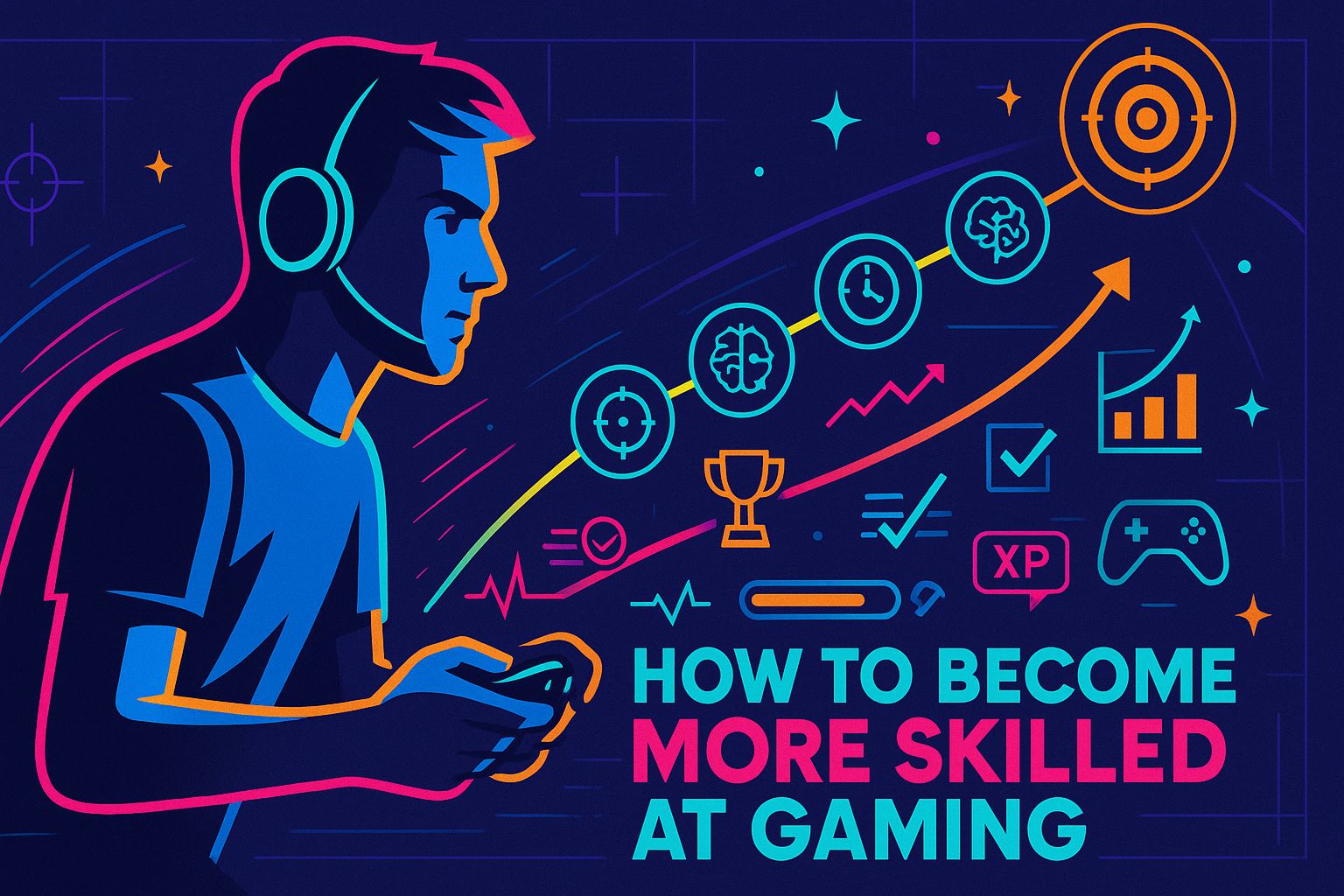Ever feel like you’ve hit a wall in your favorite multiplayer game?
It’s a common feeling. One minute you’re climbing the ranks, and the next, your hand-eye coordination feels off, or your mental focus just disappears after a few matches.
You might be wrestling with a sluggish mouse and keyboard, a graphics card that stutters in big team fights, or maybe you’re just watching streamers on Twitch and wondering how they make it look so easy.
If that sounds familiar, you’re definitely not alone. The secret that top players know is that they don’t blame their teammates. They analyze everything they do and treat every mistake as a chance to improve their personal gaming performance.
I’m going to walk you through a simple 10-step plan to level up your skills, filled with practical advice on practice routines, gameplay recording, gear, and keeping your mind and body sharp. Ready to start climbing again?
Key Takeaways
Upgrading your gaming PC with high-performance hardware like the AMD Ryzen 7 9800X3D CPU, an NVIDIA RTX 50-series GPU, and a fast NVMe SSD like the WD Black SN850X is the foundation for smooth gaming performance.
Establishing a fixed daily gaming schedule using focus methods like the Pomodoro Technique (25 minutes on, 5 minutes off) and dedicated training tools like KovaaK’s and Aim Lab leads to steady, measurable improvement.
Watching pro gamers like TenZ and Faker on Twitch and YouTube helps you learn advanced strategies; reviewing your own recorded matches with tools like OBS or Insights Capture lets you pinpoint and correct your key mistakes.
Staying hydrated with at least 6 to 8 glasses of water daily and eating brain-boosting foods like berries and nuts can significantly improve focus and reflexes during intense matches. Studies show even mild dehydration can slow reaction times.
Joining gaming communities on Discord or Reddit connects you with skilled players and coaches; using performance-tracking apps like Mobalytics offers real-time feedback and personalized training plans to accelerate your progress.
Table of Contents
Upgrade Your Gaming Gear
Switching to a high-quality keyboard and mouse or gamepad can instantly make your gameplay feel more responsive. A comfortable chair and a good headset allow you to focus entirely on the game, not on your aching back.
What high-performance hardware should I invest in?
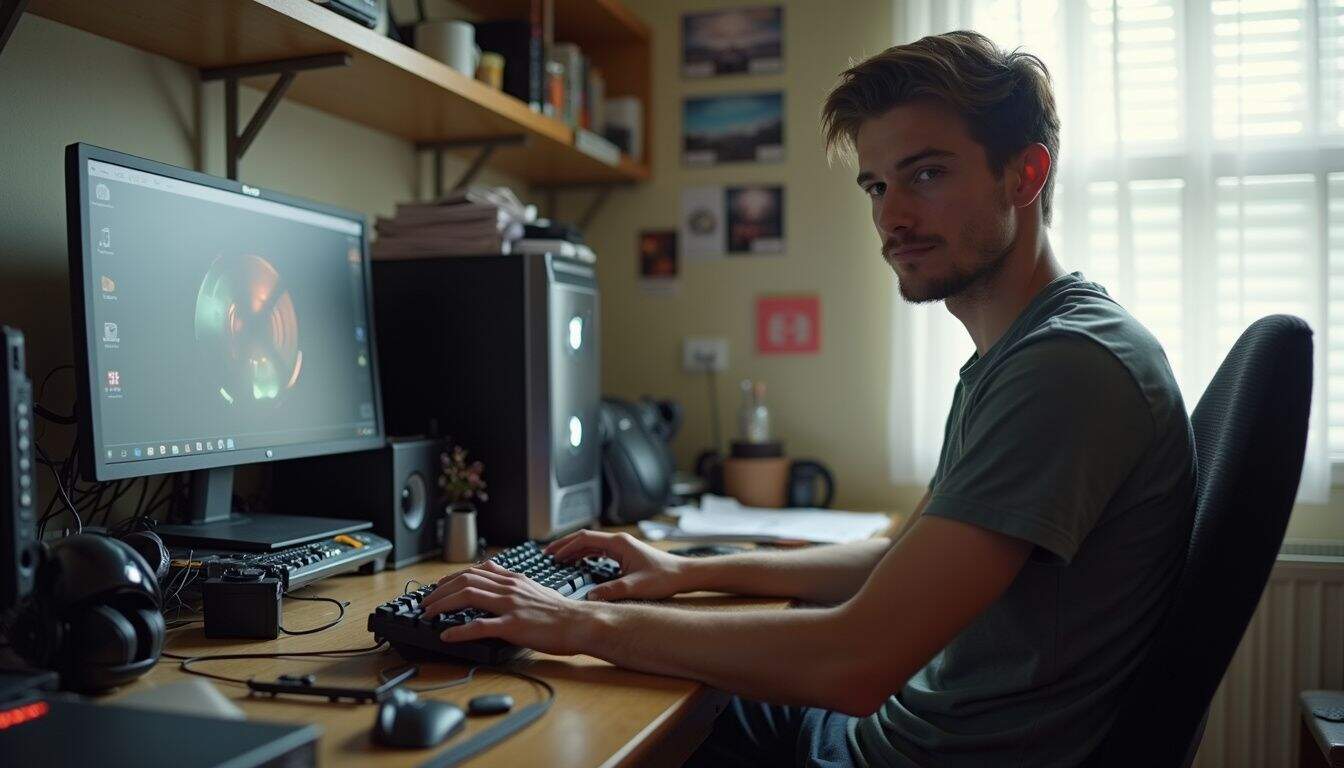
For a top-tier gaming experience in 2025, your CPU is the place to start. The AMD Ryzen 7 9800X3D is widely considered the fastest gaming CPU available, delivering incredible frames per second that leave competitors behind. If you’re also a content creator, the AMD Ryzen 9 9950X3D offers a fantastic balance of gaming prowess and productivity performance.
When it comes to your graphics card, Nvidia’s new RTX 50-series, like the RTX 5080 or 5090, provides a massive leap in 4K and VR performance. For a more budget-friendly but still powerful option, AMD’s cards like the Radeon RX 7900 XTX offer excellent performance for the price.
Here are a few other critical components:
- RAM: 16GB is the minimum for modern PC gaming, but 32GB of DDR5 RAM is becoming the sweet spot for multitasking while you game.
- Storage: An NVMe SSD is essential. Models like the Samsung 990 Pro or WD Black SN850X make loading screens practically disappear, especially on Windows 11 systems.
- Power Supply: Don’t overlook your PSU. A reliable 750W-850W unit is a safe bet for most high-end builds.
To ensure everything works together, stick with PC components, as Apple computers offer very limited upgrade paths. Getting your hardware right is the first step; next, you need to build a setup that keeps you comfortable for hours.
How can I optimize my gaming setup for comfort?
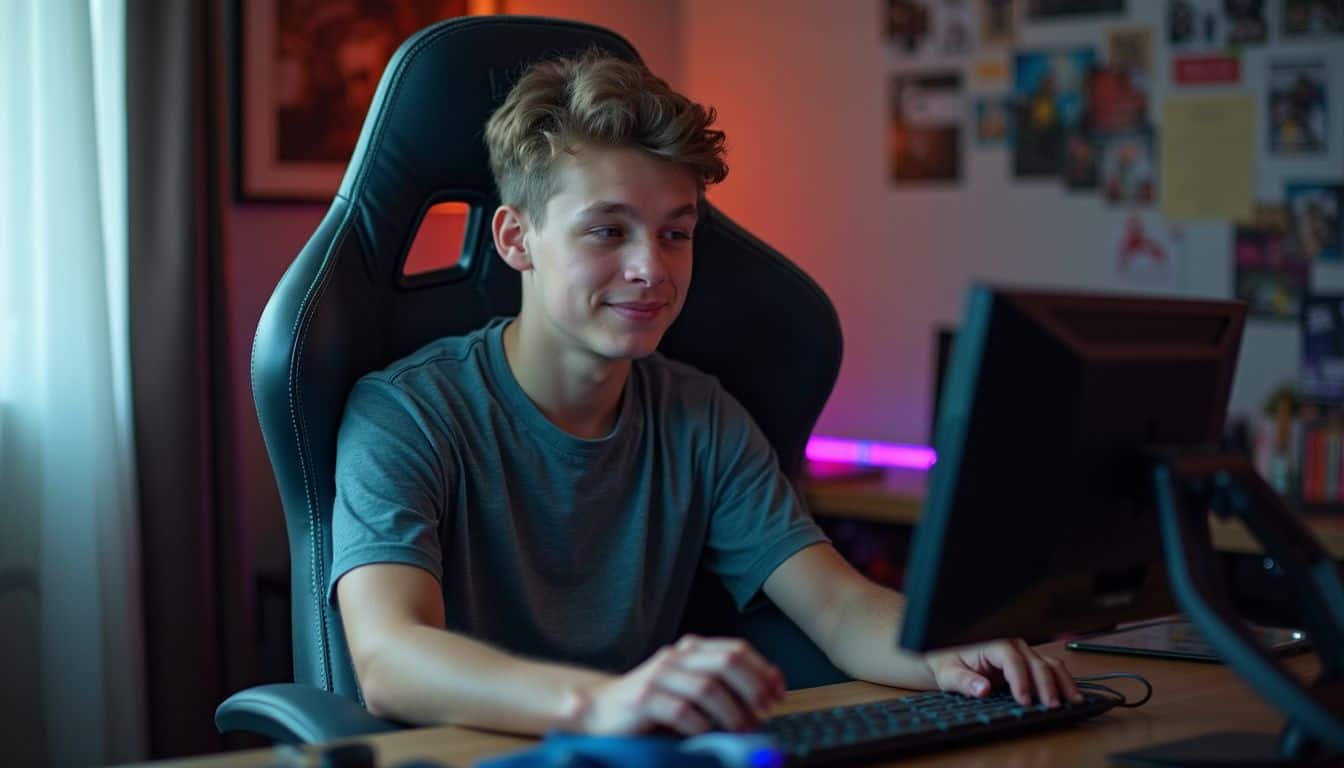
After upgrading your hardware, focusing on comfort is the next game-changer. Good posture doesn’t just prevent pain; research from Ohio State University suggests it can boost focus and confidence.
I learned this myself when I got into online casino gaming and realized my old setup was causing serious neck and back strain after just an hour. An ergonomic gaming chair was a lifesaver.
High-end options like the Herman Miller Aeron are legendary for their support, but brands like Secretlab also offer fantastic chairs designed for long sessions. Pair that with a headset with soft earcups so you can hear every footstep in games like Overwatch without discomfort.
To prevent eye and neck strain, position your monitor at eye level. Your wrists will thank you for choosing peripherals that fit your hand, whether that’s a PS4 controller or a high-DPI mouse. Soft, indirect lighting, like LED strips, can reduce glare from screens on Windows 10 or Xbox One systems and set the mood.
Finally, quiet your space. Mute notifications and close background apps to maintain focus. If you want to discover more about the casino side of gaming, a comfortable setup is just as important there.
The right setup isn’t just about fun. It keeps your body and mind ready for competition.
How do I practice gaming consistently?
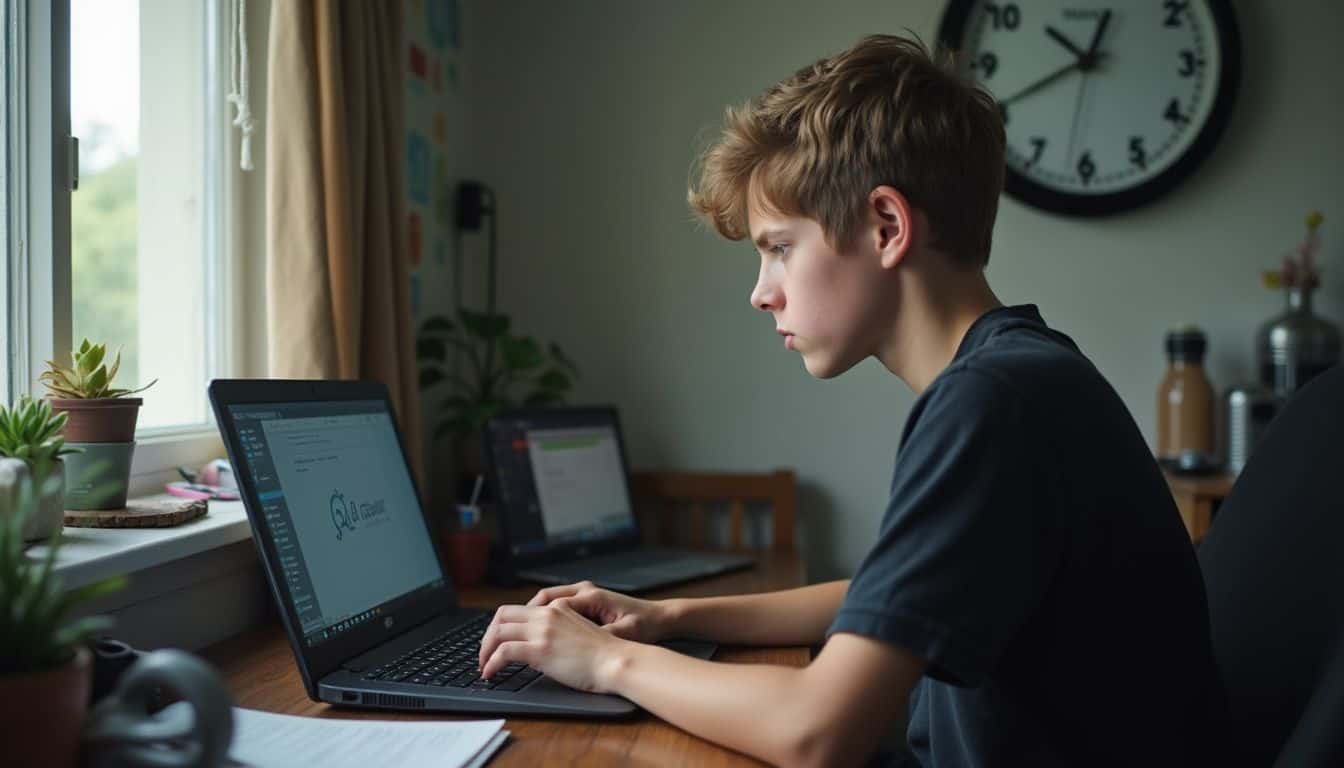
Make gaming practice a daily habit, just like anything else you want to master. Use structured methods and performance-tracking apps to make sure every session counts.
How do I establish a regular gaming schedule?
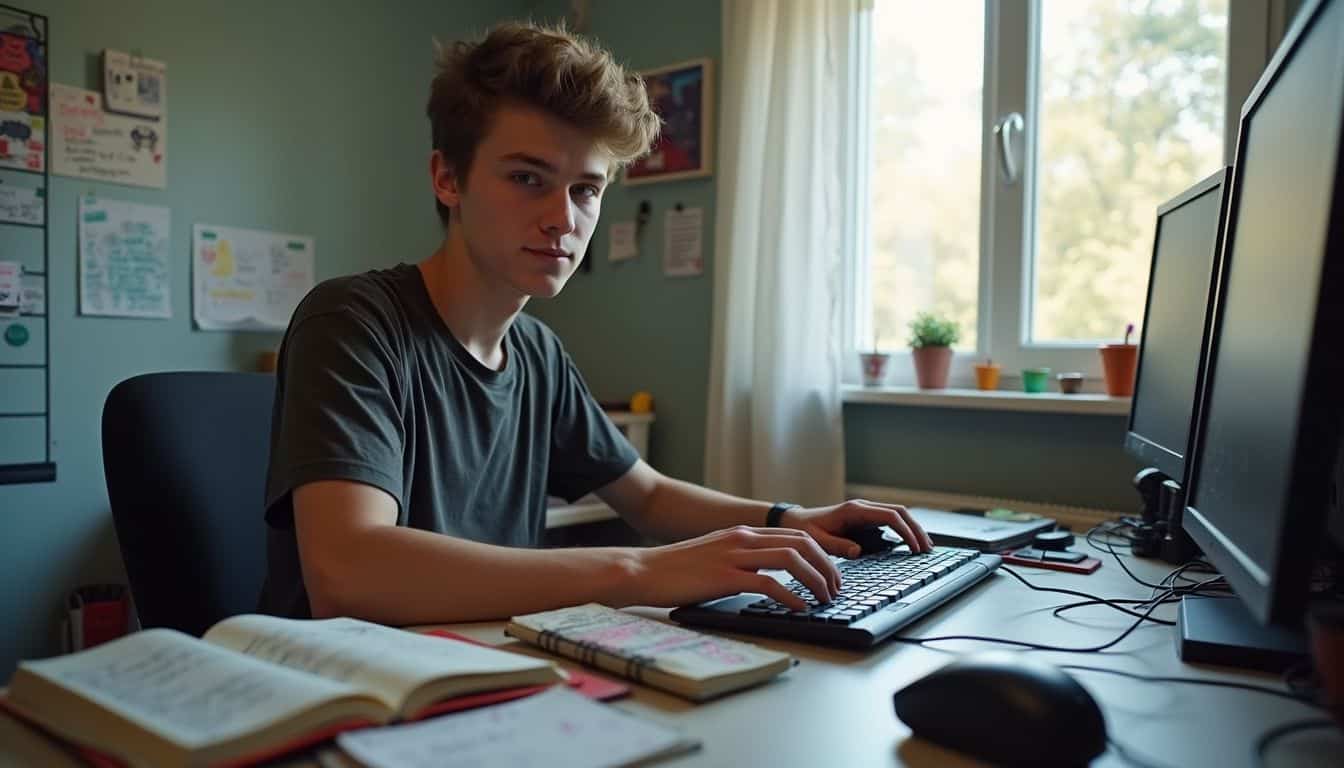
Consistency is everything. Pick a specific time slot each day or week for your gaming sessions and protect it. This could be Monday to Friday, from 6 p.m. to 9 p.m.
A great way to structure this time is with the Pomodoro Technique. This method involves breaking your practice into focused 25-minute intervals followed by a 5-minute break. After four cycles, you take a longer 15-30 minute break. This keeps your mind fresh and prevents burnout.
Before you jump in, always warm up. Stretch your wrists, dial in your mouse’s dots per inch settings, and use Windows key shortcuts to close any distracting apps. This method of deliberate practice is used by pros to focus on specific skills like aim or map awareness in each block.
Track your progress by reviewing your rank or match history. And remember to balance your schedule, so you have time for real-life quests too. Once you’ve got your schedule down, you might be ready to become a game streamer.
How can I focus on improving specific gaming skills?
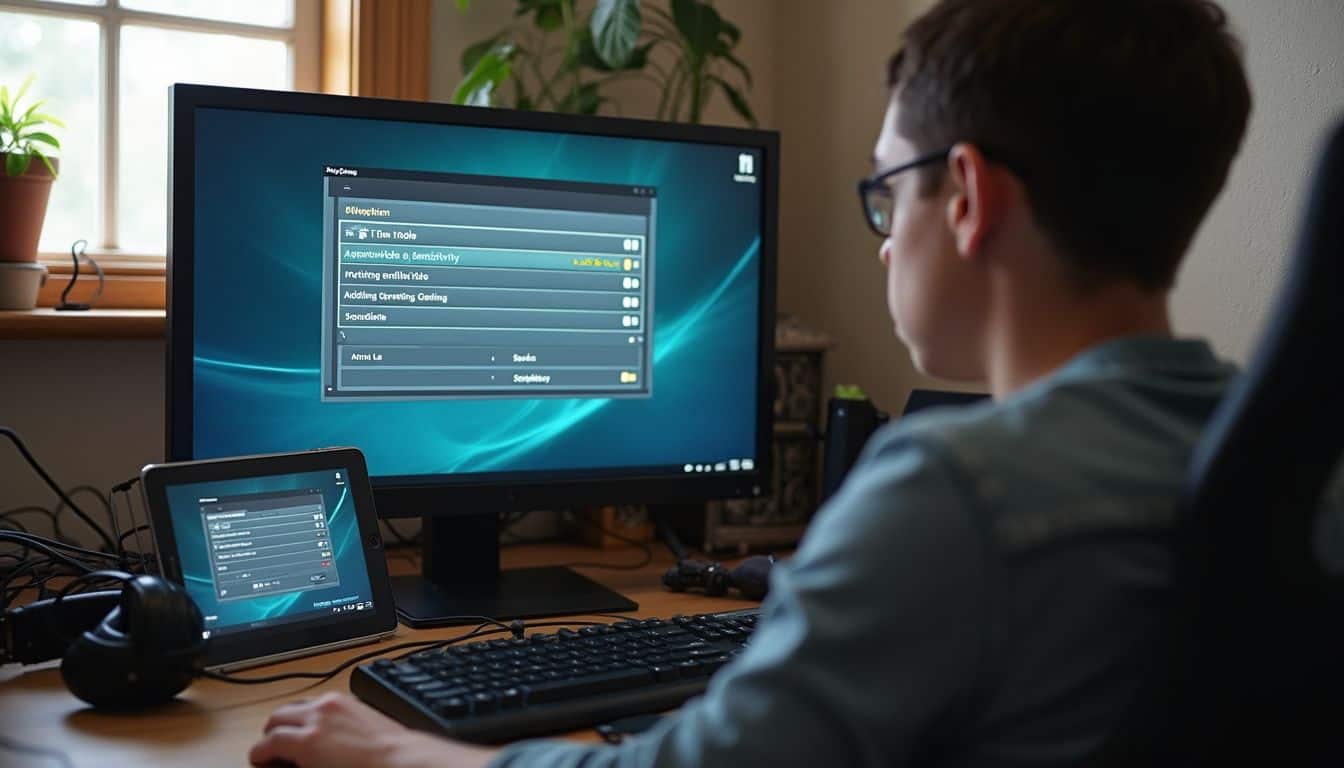
Concentrate on one skill at a time. Whether it’s aim, teamwork, or resource management, giving one area your full attention leads to faster improvement.
For mechanical skills, use aim training tools like Aim Lab or KovaaK’s for at least fifteen minutes a day. These programs are designed to improve your reaction time and precision with targeted drills.
I once dramatically boosted my headshot percentage by consciously slowing down my shots to build muscle memory instead of just spraying and praying. This works on both gaming consoles and PC.
On a PlayStation 5, for example, experiment with custom sensitivity settings to find what truly works for you instead of just copying a pro player’s setup. To improve teamwork, focus on making clear, concise calls and actively listening to your teammates. Setting small, achievable goals, like landing five perfect headshots or making three crucial team calls per match, makes progress feel tangible.
Study and Analyze Gameplay
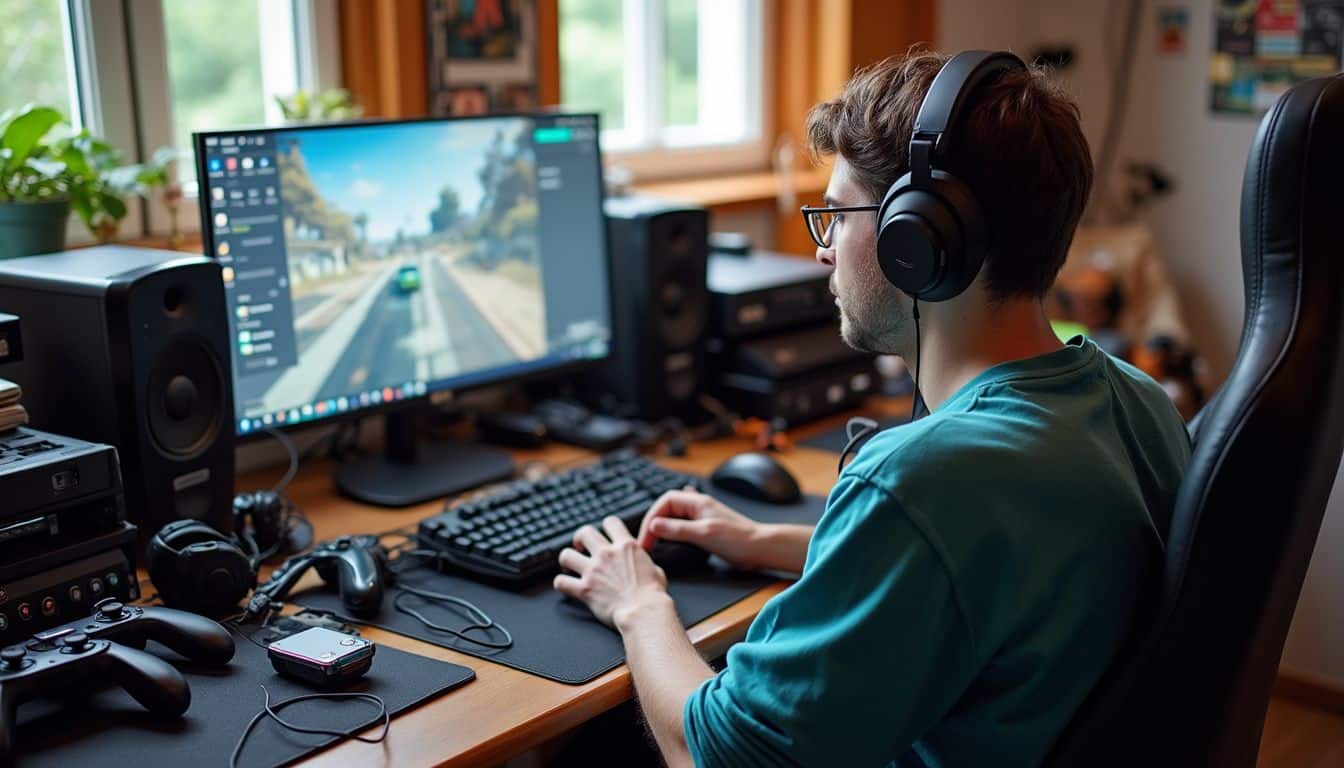
Watch the pros on Twitch or YouTube to pick up new tricks. Then, use replay tools to review your own matches and catch mistakes you didn’t see in the heat of the moment.
How can watching professional players and tutorials help me improve?
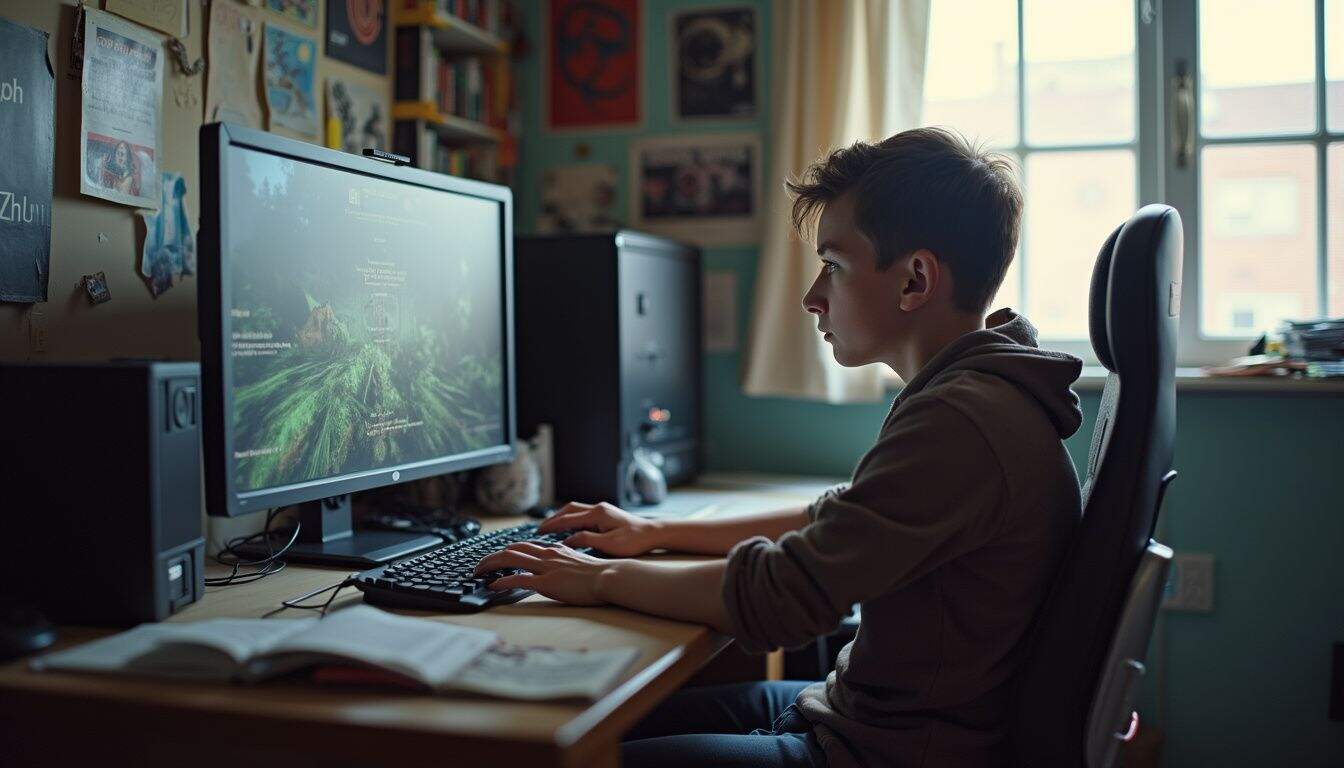
Pro players like TenZ in Valorant or Faker in League of Legends don’t just have fast reflexes; they have a deep understanding of game dynamics. Watching their streams on Twitch or YouTube gives you a masterclass in decision-making and precise skill execution.
You get to see firsthand how they handle high-pressure situations, manage their resources, and adapt their strategies on the fly. Tutorials are great because they break down these complex plays into manageable steps you can practice.
A common mistake is trying to copy a pro’s flashy moves without understanding the “why” behind them. Instead of just mimicking, ask yourself why they made a certain rotation or used a specific ability at that moment. This focus on the underlying logic is what makes the learning process stick.
What is the best way to review my own matches to find mistakes?
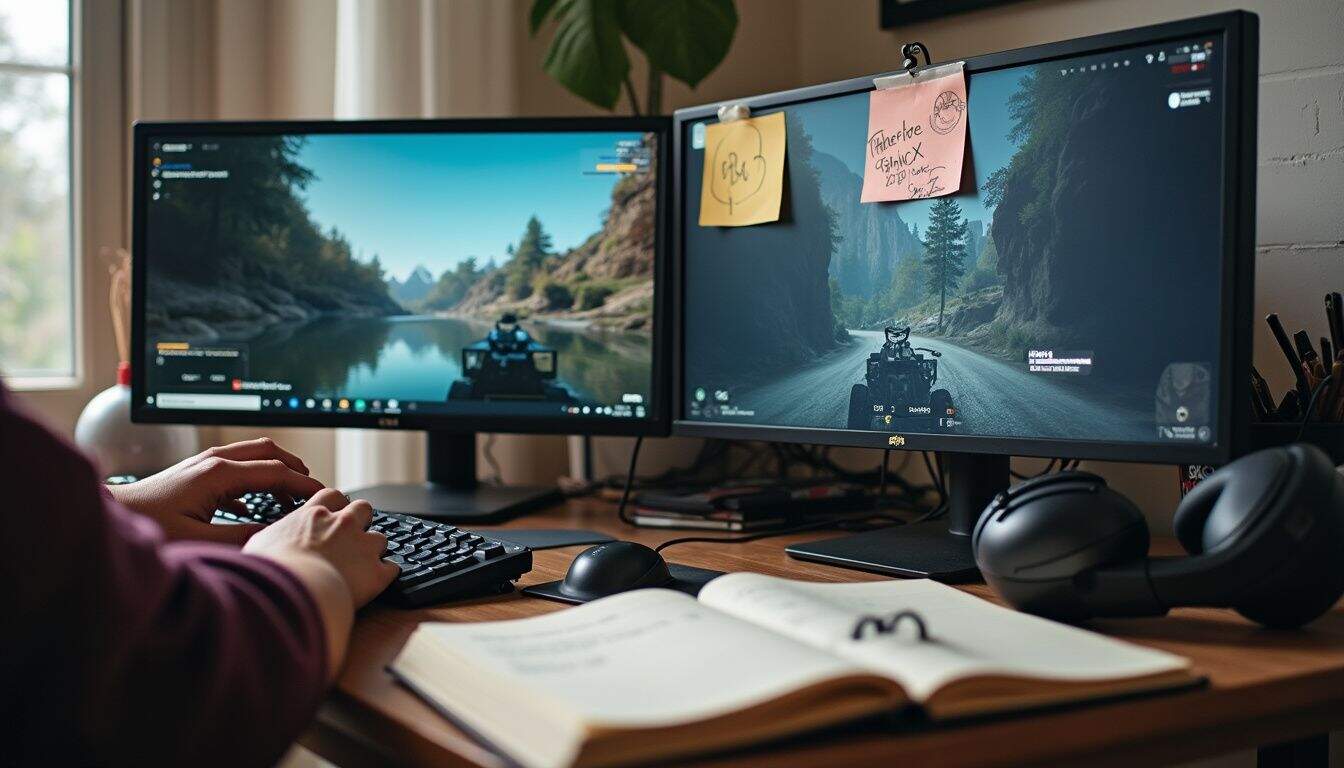
Recording your matches is one of the most powerful tools for improvement. You can use software like OBS or your console’s built-in capture features. For a more automated approach, tools like Outplayed from Overwolf can automatically clip your kills, deaths, and assists.
Review the footage right after a session while the details are still fresh. At key moments, pause and ask yourself:
- What was my goal here?
- Did I miss an opportunity?
- Was my positioning correct?
- Could I have communicated better?
Focus on patterns. If you consistently lose duels, analyze your crosshair placement and reaction time. If your team is always getting caught off guard, look at your map awareness. Having a more experienced player review your VODs (video on demand) can also provide invaluable feedback that you might miss on your own.
How do I maintain physical and mental health while gaming?
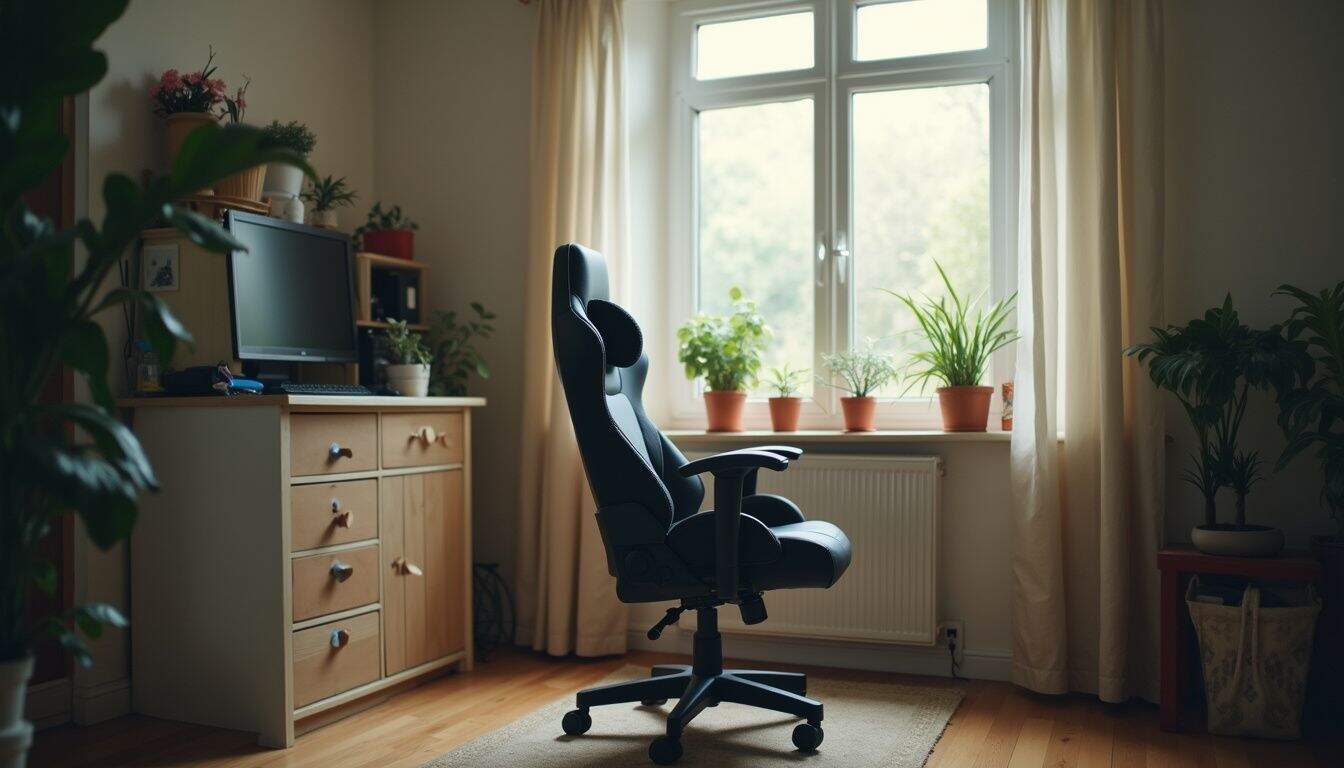
Long gaming sessions are exciting, but taking care of your body and mind is crucial for long-term success. Elite gamers understand that breaks, hydration, and nutrition are just as important as in-game skill.
Why should I take regular breaks to avoid burnout?
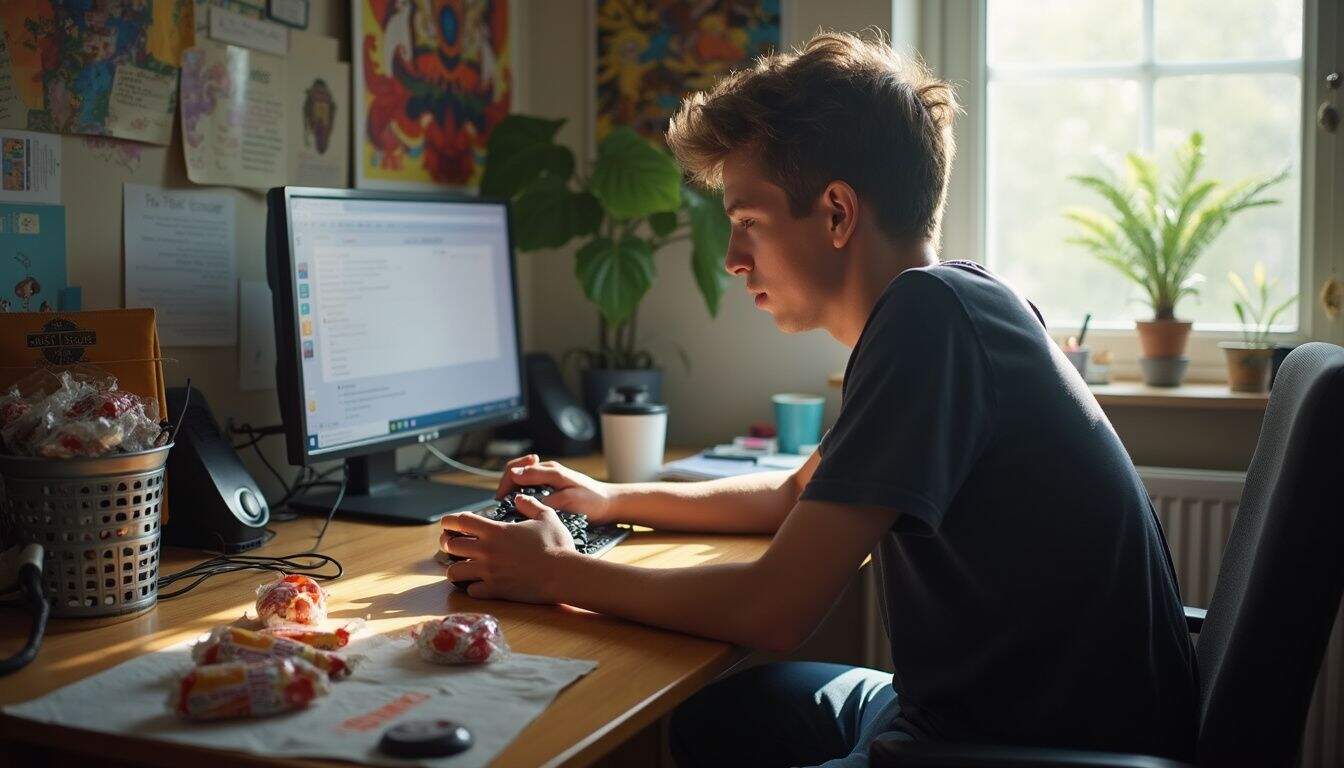
Topson, a two-time Dota 2 world champion, is known for playing a couple of games and then taking an hour-long break to reset. This isn’t just a personal preference; it’s backed by research. Dr. Matthew Barr, an expert on video games and learning, found that breaking up long sessions improves learning and helps prevent burnout.
I once tried an eight-hour marathon scrim session and my performance fell off a cliff. Never again!
A simple and effective method is the 20-20-20 rule, recommended by the American Optometric Association. Every 20 minutes, look at something 20 feet away for at least 20 seconds. This simple action helps reduce eye strain significantly.
Take a 5 to 10-minute break every hour to stand up, stretch, and walk around. This keeps your focus sharp and your body from getting stiff, helping both your mood and your cognitive behavior therapy skills when the pressure is on.
“Space out your playtime if you want to stay sharp,” says Dr. Barr.
How does staying hydrated and eating healthy affect gaming performance?
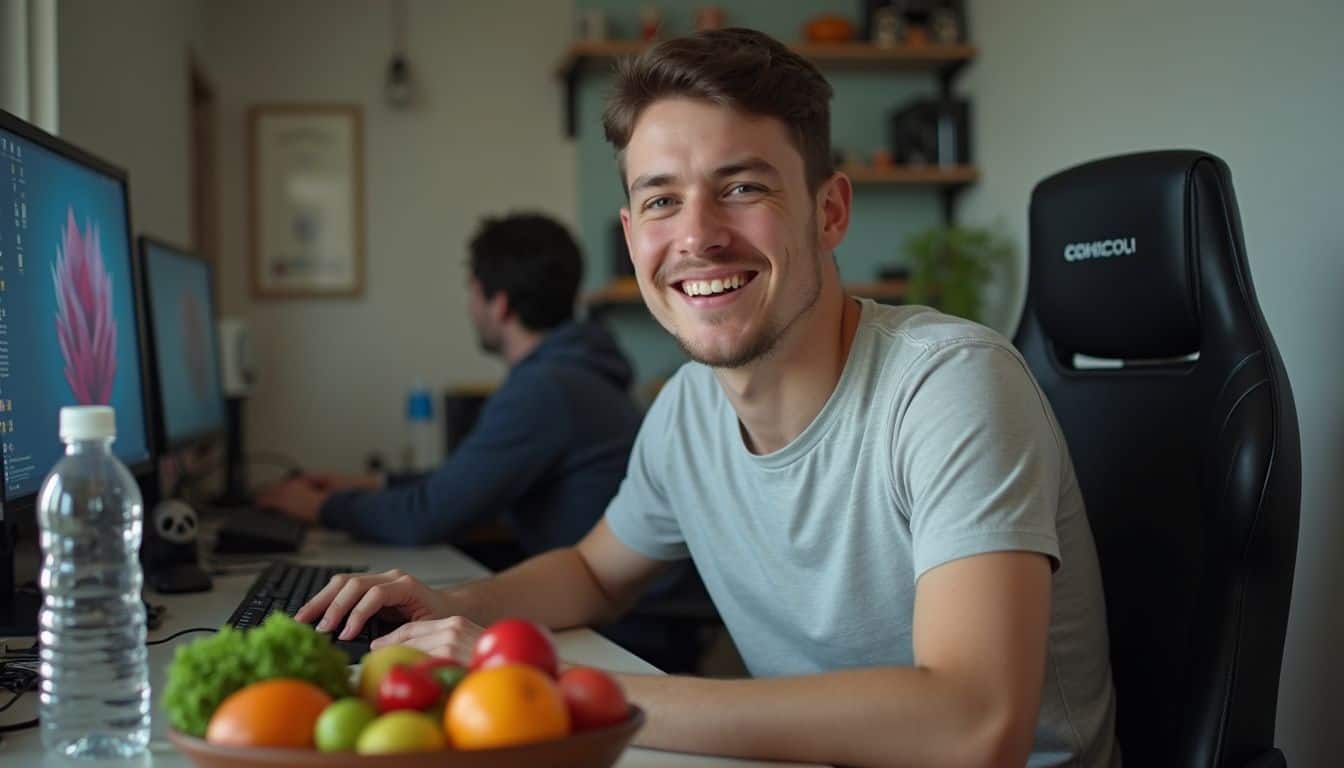
Your brain needs water to function at its best. Research has shown that even mild dehydration, a loss of just 1-2% of your body weight, can significantly slow your reaction time and impair concentration. One study found that dehydration can delay reaction times by 12-18%. The NHS recommends drinking 6 to 8 glasses of water or other clear liquids daily to stay properly hydrated.
Food is your fuel. Instead of sugary snacks that lead to energy crashes, opt for brain-boosting foods.
- Fatty Fish: Salmon and tuna are rich in omega-3s, which support brain health and cognitive function.
- Berries and Nuts: Blueberries and walnuts are packed with antioxidants that can improve memory and focus.
- Leafy Greens: Spinach and kale are full of vitamins that are essential for brain health.
My own performance improved dramatically when I swapped junk food for lean protein and vegetables. No special power-up required, just good nutrition.
How can I develop a winning mindset in gaming?
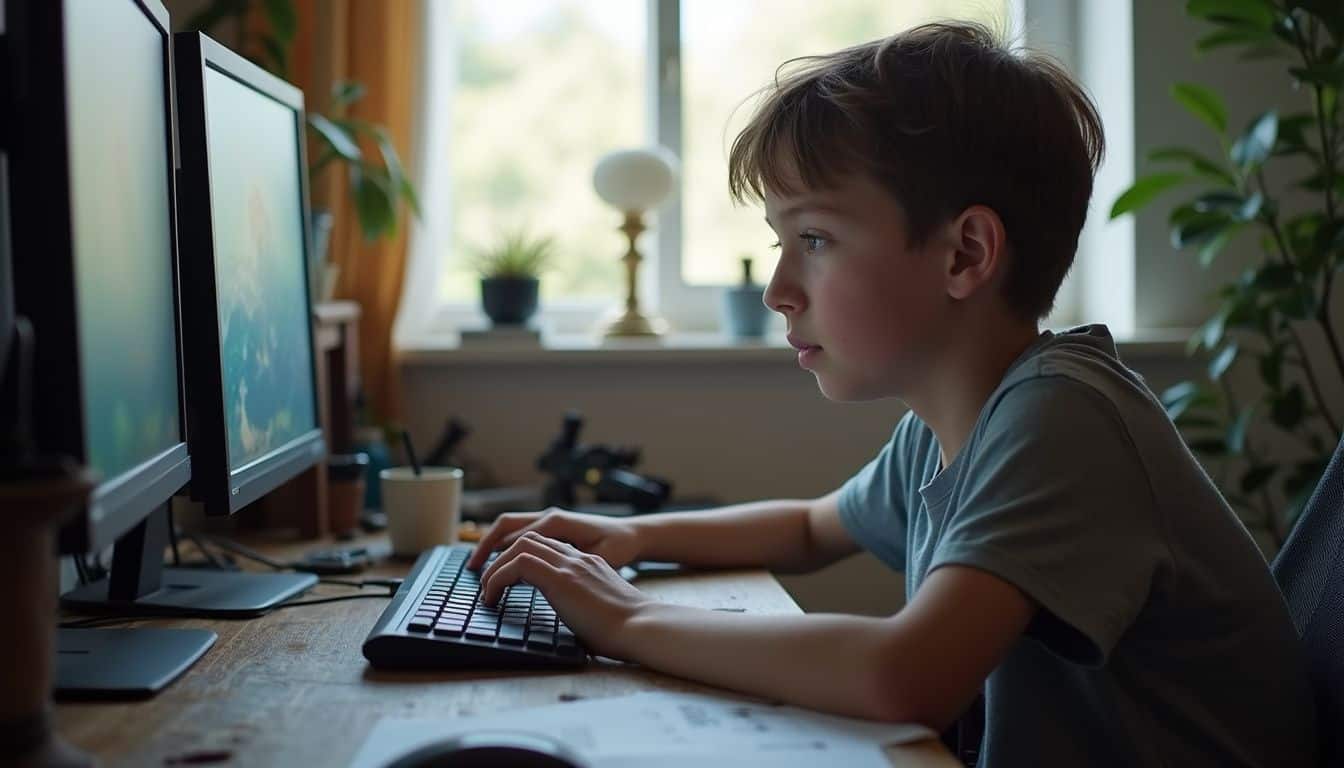
Keep your focus sharp but your attitude positive. Gaming should be a fun challenge, not a source of constant frustration. Learning to manage your emotions is a skill in itself.
Why is staying positive important and how do I avoid entitlement?
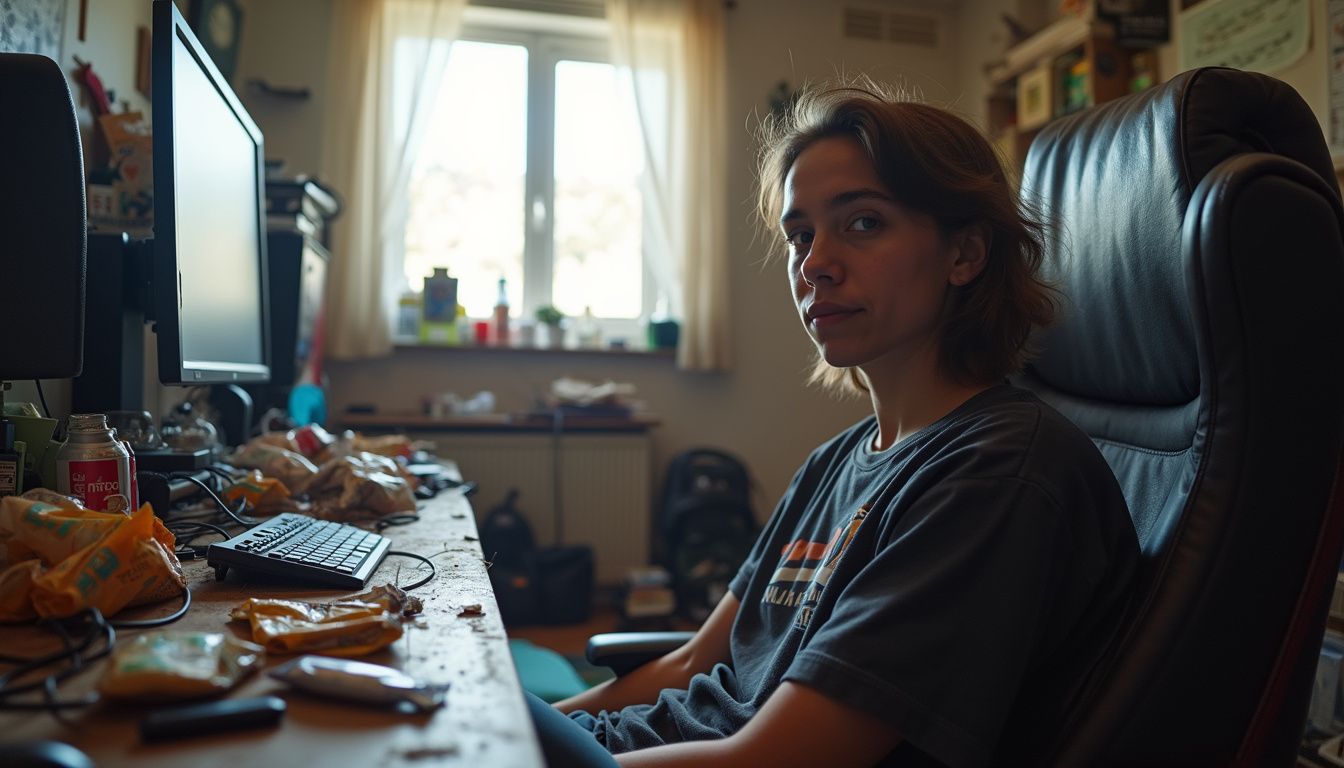
A positive attitude is a huge advantage in competitive gaming. Players with high morale are more resilient and learn faster from losses. This ties into what psychologist Carol Dweck calls a “growth mindset,” where you see challenges as opportunities to improve rather than as threats to your ego.
Blaming teammates or feeling like you deserve to win will only hold you back. Instead of getting angry, try to appreciate a good play from an opponent. This keeps your headspace clear of frustration.
Giving constructive feedback instead of engaging in toxic behavior builds team spirit and makes the game more fun for everyone. Focus on self-improvement over perfection. Even legendary players like Faker are known for their humble attitude and constant review of their own mistakes.
For more on building a competitive edge, check out these tips on the hardcore gamer mindset.
How do I manage frustration and avoid tilt during games?
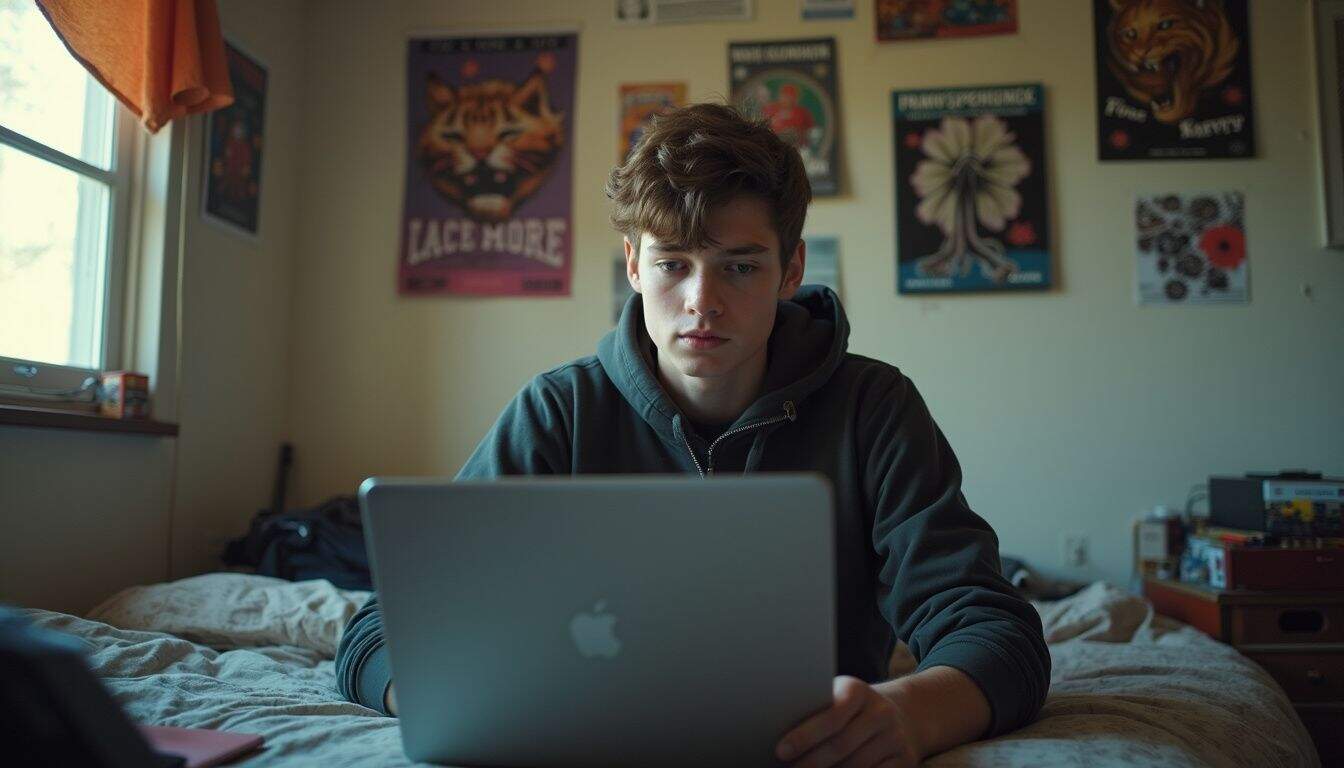
First, learn to recognize your own frustration triggers. Do you get reckless after a bad play or start snapping at teammates? When you feel that anger rising, it’s time to pause.
Tilt clouds your judgment and turns a learning opportunity into a downward spiral. A great technique to calm your nervous system is box breathing.
It’s simple: inhale for a count of four, hold your breath for four, exhale for four, and hold again for four. Repeat this a few times to clear your head.
My personal trick is to watch a couple of funny animal videos. A good laugh can quickly break the cycle of frustration. Learn from your mistakes instead of dwelling on them, and take regular breaks to keep your mindset cool during those tense endgame moments.
“You can’t control the cards you’re dealt, only how you play the hand.”
How can experimenting with different playstyles improve my gaming?
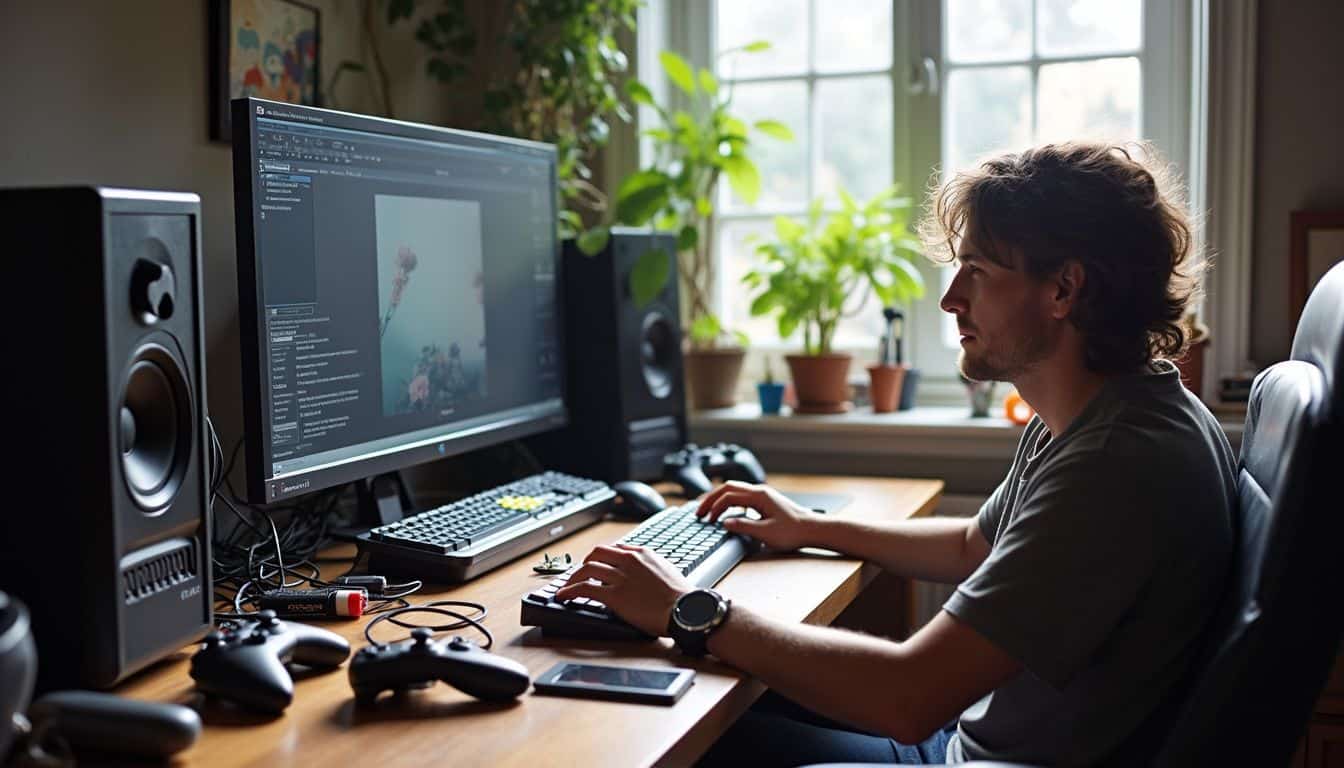
Stepping out of your comfort zone is a fantastic way to sharpen your skills. Trying new games, roles, and strategies forces your brain to adapt and learn in new ways.
What new game genres should I try to expand my skills?
Different genres train different skills that can transfer back to your main game.
- Strategy games like StarCraft II or Civilization VI hone critical thinking and long-term planning.
- Puzzle games like Portal or The Witness train your problem-solving abilities under pressure.
- First-person shooters like Halo or DOOM are amazing for improving reflexes and hand-eye coordination.
- Role-playing games (RPGs) like The Elder Scrolls stretch your creativity and teach you about character building and resource management. I once built a character who could talk their way out of any fight, and it genuinely made me a better communicator in team games.
Even casino games can sharpen your ability to assess risk and reward. The key is to challenge your brain with new types of problems. For more ideas, you can explore the [different types of gamers](https://www.geekextreme.com/different-types-of-gamers/) to see what might fit you.
How does playing with random teammates help me adapt to new dynamics?
Queueing up with random teammates is like solving a new puzzle every match. One game you might have a quiet, strategic team, and the next you’re paired with a vocal leader who makes all the calls.
Dr. Barr notes that adapting your communication style is a key teamwork skill. I’ve had to learn to lead in some games and listen in others. Cooperative play in games like Overwatch teaches you to identify team needs and fill roles quickly, whether that means playing a tank to protect your team or a support to keep them alive.
You’ll fail with strangers and learn to laugh it off, building resilience along the way. It’s a low-stakes environment to test new strategies, get immediate feedback, and improve your social skills. Plus, the communication systems in modern games, like the brilliant ping system in Apex Legends, allow for deep coordination even without saying a word.
How can I collaborate and learn from other gamers?
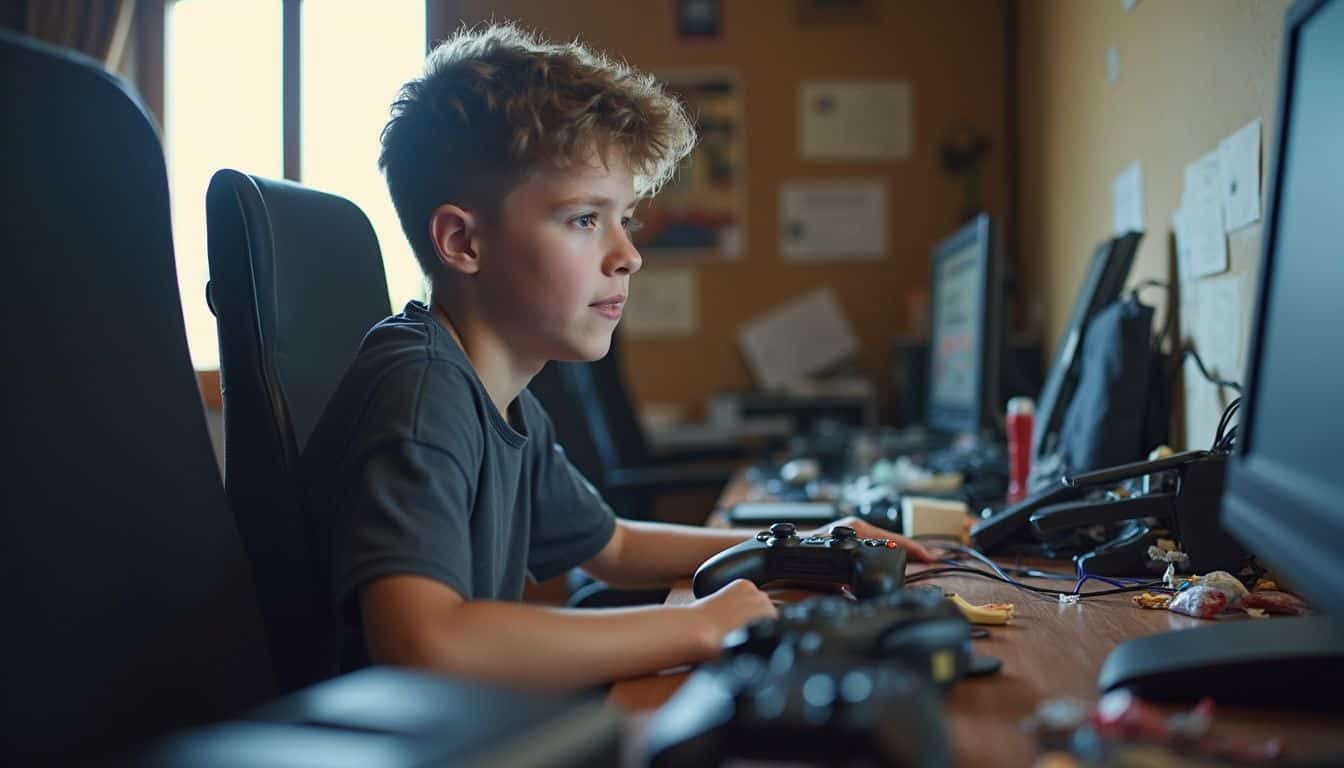
Connecting with other players on platforms like Discord and Reddit can supercharge your learning. You can swap tips, share clips, and find people to practice with.
What are the benefits of joining gaming communities to share tips?
Gaming communities are hubs of shared knowledge. On platforms like Reddit, you can find entire subreddits, like r/summonerschool for League of Legends, dedicated to helping players improve. These communities are filled with experienced players who are happy to answer questions and provide feedback.
Discord servers for your favorite games are also fantastic resources. You can find people to queue with, join discussions about strategy, and get real-time advice.
The key is to ask for help effectively. Instead of just saying, “I’m stuck,” post a clip of your gameplay and ask, “What could I have done differently in this situation?” This leads to much more specific and helpful advice.
How do I find a mentor or coach for personalized gaming guidance?
If you’re serious about improving, hiring a coach can be a great investment. Platforms like Metafy and GamerSensei connect you with experienced players, including former pros, for one-on-one coaching.
On these sites, you can browse coaches for your specific game, read reviews from other students, and find someone who fits your budget. Rates can vary widely, with coaching for a popular game like League of Legends ranging from $15 per hour for a new coach to over $150 per hour for a top-tier expert.
Many coaches offer structured lesson plans and will review your gameplay with you, providing personalized feedback and a clear path for improvement. You can also find informal mentors by being active and helpful in gaming communities on Discord or Reddit.
How can technology help me improve my gaming skills?
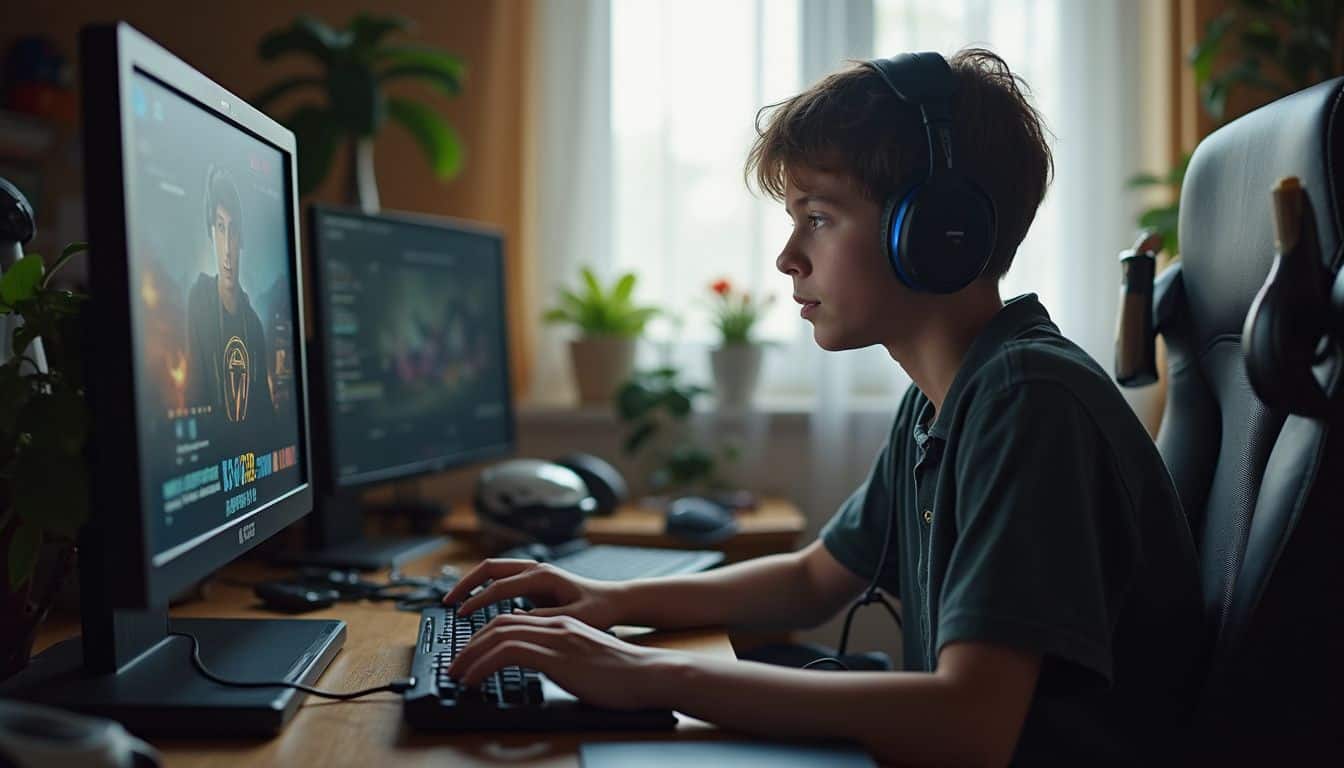
Modern tools can give you an edge by providing detailed stats and personalized feedback. Apps and AI-powered trainers can analyze your gameplay and show you exactly where you need to improve.
What performance-tracking tools and apps should I use?
There are many apps designed specifically to track your in-game performance and provide insights. For FPS games like Valorant or Apex Legends, services like Tracker.gg are fantastic for seeing detailed match histories, accuracy stats, and how you rank against other players.
For MOBA players, apps like Mobalytics, Blitz.gg, and Porofessor are indispensable. These tools often provide in-game overlays that can help with drafting, item builds, and tracking enemy cooldowns.
| Tool | Best For | Key Feature |
|---|---|---|
| Tracker.gg | Shooters (Valorant, Apex) | Detailed post-match stats and leaderboards. |
| Mobalytics | MOBAs (League of Legends) | Pre-game analysis and personalized performance index. |
| Blitz.gg | MOBAs & Teamfight Tactics | In-game overlays with build suggestions and jungle timers. |
These tools take the guesswork out of improvement, giving you hard data on what’s working and what isn’t.
How can AI-powered training programs boost my gaming?
AI-powered tools take performance tracking a step further by offering personalized training plans. Programs like Aim Lab use AI to analyze your aiming style and create custom drills to target your specific weaknesses.
Mobalytics uses a system it calls the Gamer Performance Index (GPI). This AI-driven tool analyzes your gameplay across eight different skills, including aggression, farming, and teamplay, to give you a complete picture of your strengths and weaknesses. It then provides personalized advice and content to help you improve.
These systems can spot bad habits you might not even be aware of and offer concrete steps to fix them. Many esports organizations use similar technology, showing just how effective this kind of smart training can be for players at all levels.
How Will Competitive Gaming and Skill-Building Change in 2025?
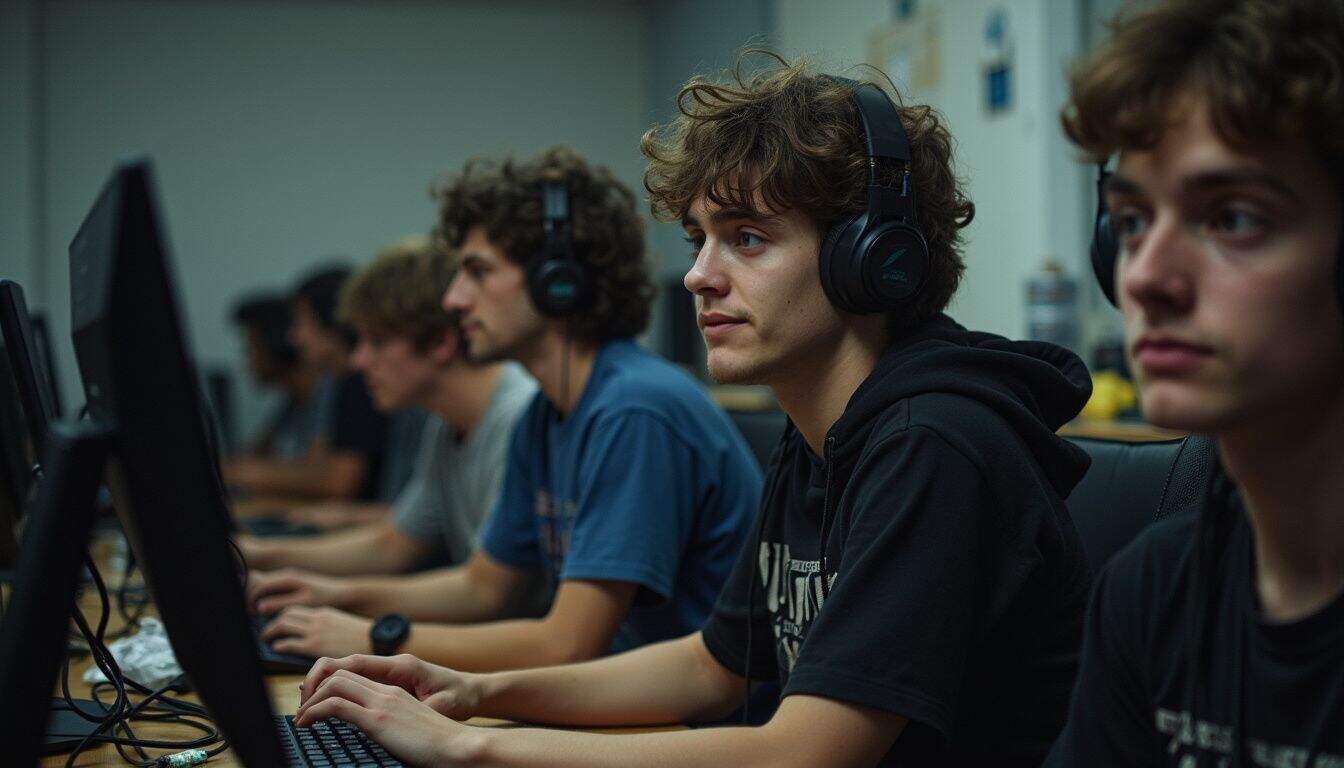
In 2025, the path to becoming a skilled gamer is more structured than ever. College Esports programs at universities like UC Irvine and Maryville University are now well-established, offering scholarships and degrees in esports.
Mobile competitive gaming is also a massive force, with games like PUBG Mobile and Arena of Valor boasting huge prize pools and making high-level competition accessible to anyone with a smartphone.
We’re also seeing huge investments in gaming infrastructure. Saudi Arabia, for example, is pouring billions into becoming a global gaming hub, funding everything from national tournaments to massive esports stadiums.
For individual players, this means more resources, better technology, and clearer
pathways to going pro. AI coaches and cloud-based analytics tools are becoming standard, giving every player access to the kind of data that was once reserved for top teams. The future of skill-building in gaming is smarter, more accessible, and more competitive than ever before.
People Also Ask
What is the first step in the Ultimate 10-Step Plan to become more skilled at gaming?
Start by setting specific, measurable goals, like increasing your headshot accuracy by 5% in Valorant within one month.
How can I practice smarter instead of just playing longer hours?
Use dedicated aim trainers like Aim Lab to run targeted drills, and then review your match replays, focusing on correcting one key mistake per session. This method of deliberate practice is far more effective than just playing endlessly.
Why does physical health matter for gamers aiming to get better?
Getting 7-9 hours of sleep directly impacts your cognitive function and reflexes, while simple habits like the 20-20-20 rule for eye strain prevent fatigue during long sessions. A healthy body supports a sharp mind.
Can teamwork really boost my skills if I prefer solo games?
Yes, using a tool like Discord to practice clear communication forces you to quickly analyze and relay information, which sharpens your situational awareness and decision-making in any game.
References
https://us.horus-x.com/blogs/news/comment-ameliorer-son-setup-gaming
https://valoresports.com/wp-content/uploads/2023/02/Ebook-10-Steps-To-High-Performance-Esports.pdf
https://pmc.ncbi.nlm.nih.gov/articles/PMC9676530/
https://www.linkedin.com/advice/1/youre-serious-gamer-how-can-you-take-your-skills-aygof (2024-01-23)
https://lichess.org/forum/general-chess-discussion/what-is-the-best-way-to-analyze-your-own-games (2019-03-19)
https://www.linkedin.com/advice/1/how-can-you-avoid-gaming-burnout-maintain-your-passion-motivation (2023-03-15)
https://medium.com/@chadlantistv/how-to-improve-in-any-video-game-7d0efe5ed053
https://britishesports.org/the-hub/advice/overcoming-tilt-in-online-gaming/ (2022-03-17)
https://www.marshmallowchallenge.com/blog/why-exploring-new-game-genres-can-make-you-a-better-gamer/
https://www.ignitiongamers.com.au/team-gaming-builds-real-skills/ (2025-04-22)
https://nichegamer.com/why-connecting-with-other-gamers-is-important-for-a-better-gaming-experience/ (2025-07-15)
https://concordeeducation.com/games/blog/how-do-i-find-a-gaming-coach/
https://moldstud.com/articles/p-top-10-real-time-analytics-tools-to-enhance-your-gaming-experience (2025-06-22)
https://www.linkedin.com/advice/0/how-can-ai-enhance-gaming-experiences-e3xic (2024-02-19)
https://www.uc.edu/news/articles/2025/02/esports-trends-in-2025–gaming-predictions-for-the-year-ahead.html (2025-02-11)
